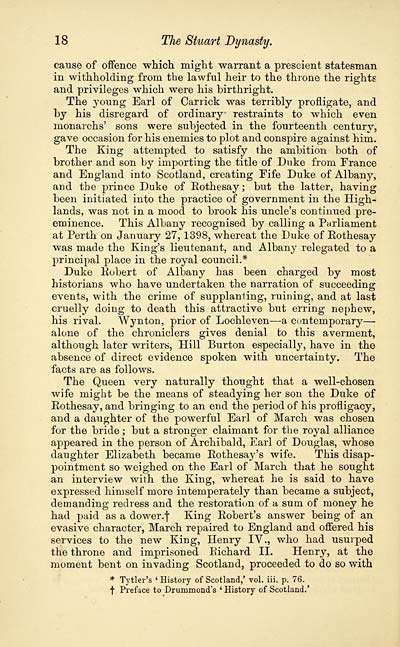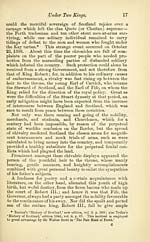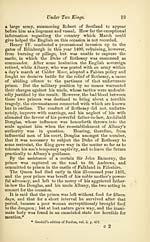Stuart dynasty
(38) Page 18
Download files
Complete book:
Individual page:
Thumbnail gallery: Grid view | List view

18 The Stuart Dynasty.
cause of offence which might warrant a prescient statesman
in withholding from the lawful heir to the throne the rights
and privileges which were his birthright.
The young Earl of Carrick was terribly profligate, and
by his disregard of ordinary restraints to which even
monarchs' sons were subjected in the fourteenth centurv,
gave occasion for his enemies to plot and conspire against him.
The King attempted to satisfy the ambition both of
brother and son by importing the title of Duke from France
and England into Scotland, creating Fife Duke of Albany,
and the prince Duke of Kothesay; but the latter, having
been initiated into the practice of government in the High-
lands, was not in a mood to brook his uncle's continued pre-
eminence. This Albany recognised by calling a Parliament
at Perth on January 27, 1398, whereat the Duke of Eothesay
was made the King's lieutenant, and Albany relegated to a
principal place in the royal council.*
Duke Robert of Albany has been charged by most
historians who have undertaken the narration of succeeding
events, with the crime of supplanting, ruining, and at last
cruelly doing to death this attractive but erring nephew,
his rival. Wynton, prior of Lochleven — a contemporary — ■
alone of the chroniclers gives denial to this averment,
although later writers, Hill Burton especially, have in the
absence of direct evidence spoken with uncertainty. The
facts are as follows.
The Queen very naturally thought that a well-chosen
wife might be the means of steadying her son the Duke of
Eothesay, and bringing to an end the period of his profligacy,
and a daughter of the powerful Earl of March was chosen
for the bride ; but a stronger claimant for the royal alliance
appeared in the person of Archibald, Earl of Douglas, whose
daughter Elizabeth became Rothesay's wife. This disap-
pointment so weighed on the Earl of March that he sought
an interview with the King, whereat he is said to have
expressed himself more intemperately than became a subject,
demanding redress and the restoration of a sum of money he
had paid as a dower.f King Robert's answer being of an
evasive character, March repaired to England and offered his
services to the new King, Henry IV., who had usurped
the throne and imprisoned Eichard II. Henry, at the
moment bent on invading Scotland, proceeded to do so with
* Tytler's ' History of Scotland,' vol. iii. p. 76.
t Preface to Drummond's ' History of Scotland.'
cause of offence which might warrant a prescient statesman
in withholding from the lawful heir to the throne the rights
and privileges which were his birthright.
The young Earl of Carrick was terribly profligate, and
by his disregard of ordinary restraints to which even
monarchs' sons were subjected in the fourteenth centurv,
gave occasion for his enemies to plot and conspire against him.
The King attempted to satisfy the ambition both of
brother and son by importing the title of Duke from France
and England into Scotland, creating Fife Duke of Albany,
and the prince Duke of Kothesay; but the latter, having
been initiated into the practice of government in the High-
lands, was not in a mood to brook his uncle's continued pre-
eminence. This Albany recognised by calling a Parliament
at Perth on January 27, 1398, whereat the Duke of Eothesay
was made the King's lieutenant, and Albany relegated to a
principal place in the royal council.*
Duke Robert of Albany has been charged by most
historians who have undertaken the narration of succeeding
events, with the crime of supplanting, ruining, and at last
cruelly doing to death this attractive but erring nephew,
his rival. Wynton, prior of Lochleven — a contemporary — ■
alone of the chroniclers gives denial to this averment,
although later writers, Hill Burton especially, have in the
absence of direct evidence spoken with uncertainty. The
facts are as follows.
The Queen very naturally thought that a well-chosen
wife might be the means of steadying her son the Duke of
Eothesay, and bringing to an end the period of his profligacy,
and a daughter of the powerful Earl of March was chosen
for the bride ; but a stronger claimant for the royal alliance
appeared in the person of Archibald, Earl of Douglas, whose
daughter Elizabeth became Rothesay's wife. This disap-
pointment so weighed on the Earl of March that he sought
an interview with the King, whereat he is said to have
expressed himself more intemperately than became a subject,
demanding redress and the restoration of a sum of money he
had paid as a dower.f King Robert's answer being of an
evasive character, March repaired to England and offered his
services to the new King, Henry IV., who had usurped
the throne and imprisoned Eichard II. Henry, at the
moment bent on invading Scotland, proceeded to do so with
* Tytler's ' History of Scotland,' vol. iii. p. 76.
t Preface to Drummond's ' History of Scotland.'
Set display mode to:
![]() Universal Viewer |
Universal Viewer | ![]() Mirador |
Large image | Transcription
Mirador |
Large image | Transcription
Images and transcriptions on this page, including medium image downloads, may be used under the Creative Commons Attribution 4.0 International Licence unless otherwise stated. ![]()
| Histories of Scottish families > Stuart dynasty > (38) Page 18 |
|---|
| Permanent URL | https://digital.nls.uk/94818222 |
|---|
| Description | A selection of almost 400 printed items relating to the history of Scottish families, mostly dating from the 19th and early 20th centuries. Includes memoirs, genealogies and clan histories, with a few produced by emigrant families. The earliest family history goes back to AD 916. |
|---|

